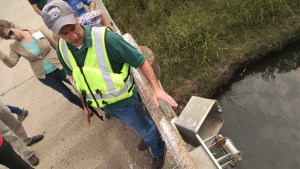Federal Water Tap, October 19: Strong El Nino Will Likely Influence Winter Weather, NOAA Says
The Rundown
El Nino gives weather forecasters more confident in winter outlook. EPA internal watchdog will do a lifecycle assessment of the renewable fuel standard. The EIA publishes a report on climate change and the power sector. Liberia earns foreign aid for a hydropower station. Congressional hearings will focus on the Paris climate talks and abandoned mine cleanup.
“The strong El Nino provides a basis for a more confident winter outlook this year. This is reflected in higher probabilities in both the temperature and precipitation outlook…But despite higher than normal probabilities, none of the usual impacts are guaranteed as the climate system is far more complicated than just El Nino, even a strong one.” — Mike Halpert, deputy director of the National Oceanic and Atmospheric Administration Climate Prediction Center, talking about the El Nino-influenced winter forecast.
By the Numbers
20 ft to 40 ft: Decline in groundwater levels around the All-American Canal, in Southern California, between 2005 and 2011. The canal was lined with concrete starting in 2007, which reduced the amount of water seeping into the aquifer. (U.S. Geological Survey)
$US 201 million: Funding to the government of Liberia to rehabilitate and expand a hydropower generating station. The funding comes through the Millennium Challenge Corporation, an aid program that began during the George W. Bush administration and is based on a competitive selection process that emphasizes rule of law and economic growth. (U.S. State Department)
$US 30 million: New funding for wetlands protection in six states in the Mississippi River Basin. (U.S. Department of Agriculture)
Studies and Reports
EIA Report: Climate Change and Energy
The reliability of America’s energy systems faces steady pressure from changes in water availability and warming temperatures, according to a U.S. Energy Information Administration report on climate change and the power sector. The report looks at vulnerabilities for nine regions in the United States and ways to build resilience.
Though all regions must reckon with water issues, coal- and gas-fired power plants in the Great Plains, Midwest, and South, because they use cooling systems that require large volumes of water, are most vulnerable to shortages or rising river temperatures, the report states.
Hydropower in the Pacific Northwest will be challenged by shrinking winter snowpack, higher demand for power, and wildfires that could damage transmission lines. Seattle’s electric utility, for instance, had to shut down three hydropower dams in August because smoke from fires was conducting electricity, which meant the lines could not be operated safely.
Renewable Fuels Assessment
The lifecycle environmental consequences of biofuels, most of which are corn-based, will be evaluated by the U.S. Environmental Protection Agency’s internal watchdog. The Office of the Inspector General will assess whether the EPA is taking the latest science into account when toting up the costs and benefits of the federal biofuels target, known as the renewable fuels standard.
News Briefs
Strong El Nino Forecast
Cool and wet in the southern half of the United States; warm and dry in the north. That’s the winter outlook from forecasters at the National Oceanic and Atmospheric Administration. The forecast (for precipitation and temperature) shows a strong influence from El Nino, the periodic warming of the waters of the eastern Pacific.
EPA Water Infrastructure Planning
The Congressional Research Service, which analyzes policy issues for members of Congress, published a report on the EPA’s process for allowing cities to structure their Clean Water Act investments so that the most cost-effective steps are taken first. Called integrated planning, the prioritization process was authorized by the EPA in 2012.
On the Radar
Paris Climate Talks
The chief U.S. climate negotiator, Todd Stern, will testify at a Senate Foreign Relations Committee hearing on October 20. The hearing will touch on the economic and environmental consequences of regulating carbon pollution.
Abandoned Mine Cleanup
The House Transportation Committee will discuss the cleanup of abandoned mines and the potential for “Good Samaritan” laws to help. Good Samaritan laws reduce the legal liability of parties who want to scrub an old mine of its waste. Representatives of mining associations, federal agencies, and green groups will testify.
Water Infrastructure Trade Mission
The U.S. government is organizing a trade mission to Southeast Asia, to help U.S. businesses tap into the region’s demand for valves, pipes, filters and other water infrastructure components. The trade mission, which takes place July 16 to 22, 2016, will visit Singapore, Vietnam, and the Philippines.
Federal Water Tap is a weekly digest spotting trends in U.S. government water policy. To get more water news, follow Circle of Blue on Twitter and sign up for our newsletter.
Brett writes about agriculture, energy, infrastructure, and the politics and economics of water in the United States. He also writes the Federal Water Tap, Circle of Blue’s weekly digest of U.S. government water news. He is the winner of two Society of Environmental Journalists reporting awards, one of the top honors in American environmental journalism: first place for explanatory reporting for a series on septic system pollution in the United States(2016) and third place for beat reporting in a small market (2014). He received the Sierra Club’s Distinguished Service Award in 2018. Brett lives in Seattle, where he hikes the mountains and bakes pies. Contact Brett Walton





Leave a Reply
Want to join the discussion?Feel free to contribute!